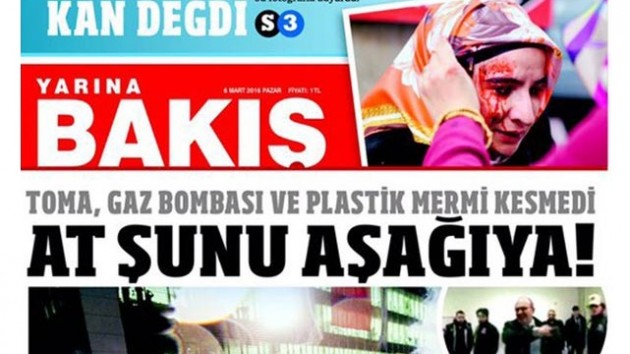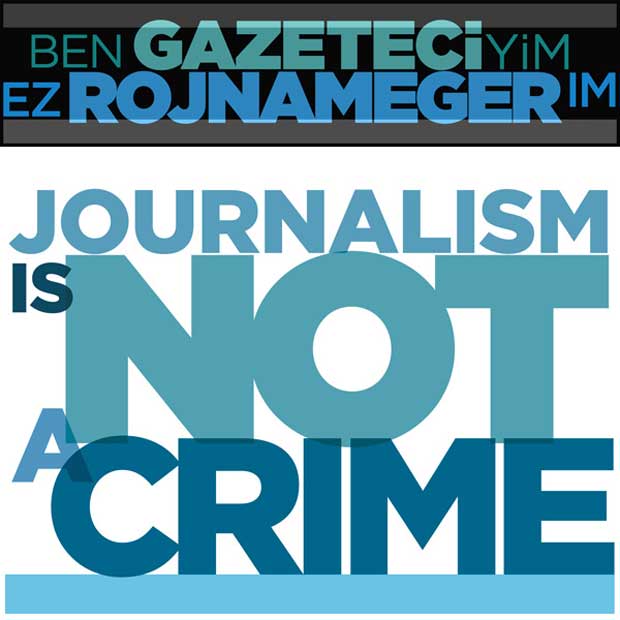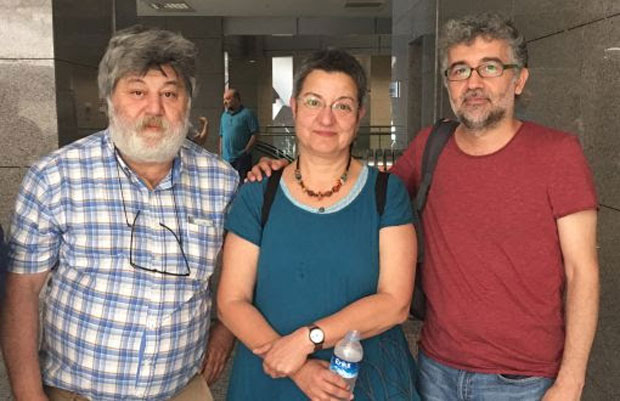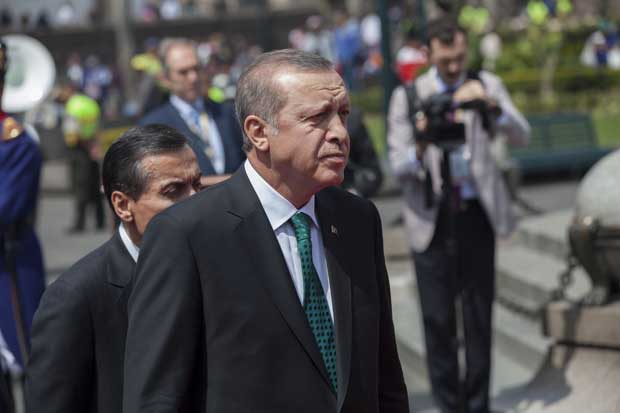21 Jul 2016 | Europe and Central Asia, Mapping Media Freedom, mobile, News and features, Turkey, Turkey Uncensored
The failed 15 July coup, bloody and despicable, delivered a lethal blow to the already crippled democratic order in Turkey. The cabal behind the putsch has become a midwife to Turkey’s “autogolpe” or self-coup. With every step, President Reccep Tayyip Erdogan and his Justice and Development Party (AKP) backers have introduced further restrictive sanctions.
This creeping self-coup is a prospect I raised in early 2014 with a long analysis for the German edition of Le Monde Diplomatique entitled Putsch im Zeitlupe. In that article I pointed out the parallels between the career of Alberto Fujimori, the former Peruvian president who is in prison for his corruption, and the increasingly autocratic methods employed by Erdogan.
The reaction to the totally unacceptable coup so far sadly has endorsed my theory. The reformatting of the Turkish state is now in fast-forward mode with a massive purge underway.
Tension has spilled over into academia. The head of the Supreme Board of High Education (YÖK), which itself is the product of the 1980 military coup d’état, called all the presidents of universities to an emergency meeting. It was followed by two drastic steps: YÖK issued a directive demanding the resignations of 1,577 deans across the country and, on Wednesday morning, blocked travel for all academics who were travelling abroad. YÖK also ordered all Turkish academics resident in universities in other countries to return home.
The media has been strangled even further. Within the past 48 hours, around 20 news sites were blocked by the Telecommunications Authority (TIB). On Tuesday night, the High Board of Radio and TV (RTUK) cancelled the licences of 24 TV and radio channels. The office of the press directorate announced that the press cards of 34 editors and reporters were cancelled. Officials cited “linkage with FETO structures” when explaining the bans. According to Turkish authorities, FETO is the terrorist organisation headed by the US-based cleric Fetullah Gulen, who has created a parallel state and is behind the failed coup.
The daily Özgür Düşünce, now accused of being an extension of “FETO terror organisation”, announced on Wednesday it was shutting down. The irony is that the daily that had assembled the finest core of liberal columnists who for many years struggled for a democratic order.
Also on Wednesday the editor of Meydan daily Levent Kenez and managing editor Gülizar Baki were arrested during a police raid without any explanation. Both are first class journalists.
Another drama has been developing around Wikileaks, which has published nearly 300,000 emails along with thousands of attached files from 762 mailboxes that allegedly belong to email domain of the AKP. The e-mails span between 2010 and June 2016.
Wikileaks was banned after some hours. “Turks will likely be censored to prevent them reading our pending release of 100k+ docs on politics leading up to the coup,” an earlier statement by Wikileaks read. It was later reported that ”WikiLeaks’ infrastrucutre was under sustained attack” following its announcement.
Concerns are at the alert level internationally. The International Federations of Journalists and the European Federations of Journalists contacted the Council of Europe about a series of new press freedom violations. Mapping Media Freedom has logged 18 violations of press freedom aimed at news outlets or professionals since the night of the coup attempt.
All journalists affiliated with the independent outlets know they have to work on the realistic presumption that conditions will worsen for them. If the Erdogan-led government has decided to deepen the path towards a self-coup and to utilise the extraordinary circumstances to ruthlessly settle scores with all dissent and opposition, the presumption is legitimate. All segments of civil society may soon be unable to avoid feeling they have been “taken hostage” as a result of the coup attempt that has pushed Turkey back decades.
A version of this article was originally posted to Suddeutsche Zeitung. It is published here with permission of the author.

Turkey Uncensored is an Index on Censorship project to publish a series of articles from censored Turkish writers, artists and translators.
20 Jul 2016 | Europe and Central Asia, Mapping Media Freedom, News and features, Turkey, Turkey Uncensored

The 6 March 2016 edition of Yarına Bakış, an independent newspaper print houses now refuse to publish
On Tuesday 19 July, Turkey’s independent and critical journalists, academics and law experts woke up to another day of concern and fear.
The uncertainty is driven by the lack of assurances on media freedom or even a basic respect for the rule of law. At a time when the country is purging its administration of alleged coup plotters, its leaders should be calming nerves and calling for transparency. On the contrary, President Reccep Tayyip Erdoğan and Prime Minister Binali Yıldırım appear to be in favour the reintroduction of the death penalty.
The media is the most fragile element in the middle of the mess.
Arzu Yıldız, a rigorously independent expert reporter on judicial affairs, was one of the first to feel the heat. An arrest order — with no reason given — was issued against her but the police who came to her flat early on Monday morning were unable to find her. She later tweeted that, since she “had nothing to fear” she would surrender to the police. So far, no further news has been heard about her.
Colleagues I spoke to share the view that by silencing such an expert reporter the authorities may be intending to erect a wall to hide what has been “really” happening — what many of us see as a massive purge within the judiciary — where more than 2,500 members (judges and prosecutors) are sought under a mass arrest order. Yıldız knows many of them, who they are and what they stand for.
Hours after the collapse of the coup attempt, a long list of journalists “to be arrested” went into circulation. Most of them are either editors or columnists — mainly liberals and leftists — who have been writing for newspapers as Özgür Düşünce, Yarına Bakış and Yeni Hayat. They have all now been smeared as affiliates of the Gülen Movement. Can Dündar, the editor of Cumhuriyet daily, is also among those targeted.
Since the day after the bloody coup attempt a media blackout has spread. More than 10 news websites have been shut down. On Monday night it was reported that several print houses refused to print Yarına Bakış and Yeni Hayat dailies, with no reason given. The editors feel that political pressure or fear lie behind them. Yarına Bakış issued an editorial online stating that it was forced to suspend its print edition, citing oppressive measures. On Tuesday, the liberal Özgür Düşünce daily, many of whose columnists found themselves to be victims of the witch hunt, announced it was also considering discontinuing its print edition. The independent website Haberdar, that was the first to break the coup attempt story, is to radically downsize, closing its newsroom and firing staff, according to inside sources.
There seems to be agreement among Turkey’s down-trodden, critical journalists and their foreign colleagues that the “dark times” will be long lasting and it may spell an end to independent journalism altogether.
Many fear a crackdown will sweep through the Turkish and Kurdish media. There are concerns over the closure of one free outlet after the other, the financial struggles these organisations face and the journalists forced into unemployment, declared as “public enemies” or “pariahs” and left without mediums to report and comment. The situation could not be any more serious.
A version of this article was originally posted to Suddeutsche Zeitung. It is published here with permission of the author.

Turkey Uncensored is an Index on Censorship project to publish a series of articles from censored Turkish writers, artists and translators.
13 Jul 2016 | mobile, News and features, Turkey, Turkey Uncensored

The above was part of a series of tweets were sent out by Platform for Independent Journalism (P24) near midnight on 11 July. P24 joined editors, reporters, columnists, bloggers and civil society activists, who are, despite being a minority in the shackled media sector in Turkey, determined to defend the honour of our noble profession till the very end.
The “Journalism is not a crime” logo is now in circulation in Turkish, Kurdish, English and a variety of other languages. The hope is that this slogan will trigger widespread domestic and international solidarity to rescue Turkey’s journalism from being turned into a total wreck.
On Tuesday morning, I watched three of the figures behind the campaign on TV. It is a rarity, these days, that any voice in defence of freedoms and rights find a public space on Turkey’s TV stations. It filled me with a sense of pride, hope and courage, but was tinged with a slight sense of despair.
That any so-called private mainstream TV channel would invite them on to share their views is a daredevil act, because these newsrooms are practically run by the same proprietors and their puppet editors, whose variety of businesses are strictly dependent on the public contracts, and any challenge to the AKP government would mean severe punishment. This is the impact self-censorship, in addition to direct censorship, has had on public debate as well as free reporting in roughly 90% of the Turkish media.
The appearance of Fehim Işık, a Kurdish columnist, Said Sefa, owner of the independent news site Haberdar, and Arzu Demir, a leading figure in the Turkish Journalists’ Union on the tiny Can Erzincan TV took place with an air of gloom. One of the three or four channels still willing to broadcast critical and diverse content, this channel will be dropped fromTurksat satellite by 20 July, on the back of a murky decision by the satellite board over claims it spreads terrorist propaganda.
Experienced lawyers are flabbergasted once more by the lawlessness reigning over the media domain, but there is little they can do about it. A month or so ago, another TV channel, IMC TV, met the same fate and was forced to switch to a different satellite service, losing more than 75% of its mainly Kurdish audience. Can Erzincan TV, a financially strapped and tiny liberal outlet, will also lose viewers. This is a cunning form of censorship by the authorities.
With Can Erzincan TV pushed out of the limelight, Turkish viewers will be left only with Halk TV and FoxTV, both of which are also in the crosshairs for further punitive actions.
When – rather than if – they also are gone, the AKP will have a free ride on the most powerful, efficient medium in journalism. Remnant portions of dignified journalists, regardless of their political colour, will have to retreat into a handful newspapers and news sites.
This is the bad news.
The good news is that, as I expected, the very core of real journalism in Turkey is intent on professional resistance to further erosion. The current initiative #Iamajournalist is yet another amazing attempt to rise up. I watched it develop spontaneously as a social media movement, which rapidly turned into a community action.
The very good news is that it now contains elements which find common cause between the liberals, leftists, Kurds, seculars, and concerned conservatives: protecting journalism as the main pillar of democracy. This is unfinished business in Turkey, and something the country’s “dark forces” want to reverse in full.
For a week starting from July 11, a handful of newspapers, websites and TV channels will display the “Journalism is not a crime” logo. Social media, too, is busy.
“Protecting freedom of press also means defending the public’s right of access to information. In a society where the right to information is restricted, one cannot speak of democracy,” they say.
“As journalists we will do everything within our power to be the voice of those who have been marginalised, imprisoned, and silenced for doing their jobs and defending the freedom of press and freedom of access to information for all of us.”
We must now keep in our minds the 44 journalists in Turkish jails. It’s a grim number that will rise. There are thousands of journalists who are forced to operate in newsrooms resembling labor camps, or — to use a term I used in my Harvard paper a year and a half ago – “open-air prisons”, subordinated to spread propaganda, lies and hate speech.
This spontaneous initiative, which grew without the involvement of some polarised journalist organisations, needs attention, and support. Journalists in Turkey are tough nuts, but the conditions are swiftly hardening. We need to keep the spirit of journalism alive.

Turkey Uncensored is an Index on Censorship project to publish a series of articles from censored Turkish writers, artists and translators.
22 Jun 2016 | News and features, Turkey, Turkey Uncensored

From left, Ahmet Nesin (journalist and author), Şebnem Korur Fincancı (President of Turkey Human Rights Foundation) and Erol Önderoğlu (journalist at Bianet and RSF Turkey correspondent). (Photo: © Bianet)
I have known Erol Önderoğlu for ages. This gentle soul has been monitoring the ever-volatile state of Turkish journalism more regularly than anybody else. His memory, as the national representative of the Reporters Without Borders, has been a prime source of reference for what we ought to know about the state of media freedom and independence.
On 20 June, perhaps not so surprisingly, we all witnessed Erol being sent to pre-trial detention, taken out of the courtroom in Istanbul in handcuffs.
Charge? “Terrorist propaganda.” Why? Erol was subjected to a legal investigation together with two prominent intellectuals, author Ahmet Nesin, and Prof Şebnem Korur Fincanci – who is the chairwoman of the Turkish Human Rights Foundation – because they had joined a so-called solidarity vigil, as an “editor for a day”, at the pro-Kurdish Özgür Gündem daily, which has has been under immense pressure lately.
This vigil had assembled, since 3 May, more than 40 intellectuals, 37 of whom have now been probed for the same charges. One can now only imagine the magnitude of a crackdown underway if the courts copy-paste detention decisions to all of them, which is not that unlikely.
Journalism has, without the slightest doubt, become the most risky and endangered profession in Turkey. Journalism is essential to any democracy. It’s demise will mean the end of democracy.
Turkey is now a country — paradoxically a negotiating partner with the EU on membership — where journalism is criminalised, where its exercise equates to taking a walk on a legal, political and social minefield.
“May God bless the hands of all those who beat these so-called journalists” tweeted Sait Turgut, a top local figure of AKP in Midyat, where a bomb attack on 8 June by the PKK had claimed 5 lives and left more than 50 people wounded.
Three journalists – Hatice Kamer, Mahmut Bozarslan and Sertaç Kayar – had come to town to cover the event. Soon they had found themselves surrounded by a mob and barely survived a lynch attempt.
Most recently, Can Erzincan TV, a liberal-independent channel with tiny financial resources but a strong critical content, was told by the board of TurkSat that it will be dropped from the service due to “terrorist propaganda”. Why? Because some of the commentators, who are allowed to express their opinions, are perceived as affiliated with the Gülen Movement, which has been declared a terrorist organisation by president Recep Tayyip Erdoğan.
It is commonplace for AKP officials from top down demonise journalists this way. Harrassment, censorship, criminal charges and arrests are now routine.
Detention of the three top human rights figures, the event in Midyat or the case of Can Erzincan TV are only snapshots of an ongoing oppression mainly aimed at exterminating the fourth estate as we know it. According to Mapping Media Freedom, there have been over 60 verified violations of press freedom since 1 January 2016.
The lethal cycle to our profession approaches its completion.
While journalists in Turkey – be they Turkish, Kurdish or foreign – feel less and less secure, the absence of truthful, accurate, critical reporting has become a norm. Covering stories such as the ”Panama Papers” leak — which includes hundreds of Turkish business people, many of whom have ties with the AKP government — or the emerging corruption case of Reza Zarrab — an Iranian businessman who was closely connected with the top echelons of the AKP — seems unthinkable due to dense self-censorship.
Demonisation of the Kurdish Political Movement and the restrictions in the south eastern region has made it an extreme challenge to report objectively on the tragic events unfolding in the mainly Kurdish provinces which have forced, according to Amnesty International, around 500,000 to leave their homes.
Journalism in Turkey now means being compromised in the newsrooms, facing jail sentences for reportage or commentary, living under constant threat of being fired, operating under threats and harassment. A noble profession has turned into a curse.
In the case of Turkey, fewer and fewer people are left with any doubt about the concentration of power. It’s in the hands of a single person who claims supremacy before all state institutions. The state of its media is now one without any editorial independence and diversity of thought.
President Erdoğan, copying like-minded leaders such as Fujimori, Chavez, Maduro, Aliyev and, especially, Putin, did actually much better than those.
His dismay with critical journalism surfaced fully from 2010 on, when he was left unchecked at the top of his party, alienating other founding fathers like Abdullah Gül, Ali Babacan and others who did not have an issue with a diverse press.
Soon it turned into contempt, hatred, grudge and revenge.
He obviously thought that a series of election victories gave him legitimacy to launch a full-scale power grab that necessitated capturing control of the large-scale media outlets.
His multi-layered media strategy began with Gezi Park protests in 2013 and fully exposed his autocratic intentions.
While his loyal media groups helped polarise the society, Erdoğan stiffly micro-managed the media moguls with a non-AKP background — whose existence depended on lucrative public contracts — to exert constant self-censorship in their news outlets, which due to their greed they willingly did.
This pattern proved to be successful. Newsrooms abandoned all critical content. What’s more, sackings and removals of dignified journalists peaked en masse, amounting now to approximately 4,000.
By the end of 2014, Erdoğan had conquered the bulk of the critical media.
Since 2015 there has been more drama. The attacks against the remaining part of the critical media escalated in three ways: intimidation, seizure and pressure of pro-Kurdish outlets.
Doğan group, the largest in the sector, was intimidated by pro-AKP vandalism last summer and brought to its knees by legal processes on alleged “organized crime” charges involving its boss.
As a result the journalism sector has had its teeth pulled out.
Meanwhile, police raided and seized the critical and influential Koza-Ipek and Zaman media groups, within the last 8 months, terminating some of its outlets, turning some others pro-government overnight and, after appointing trustees, firing more than 1,500 journalists.
Kurdish media, at the same time, became a prime target as the conflict grew and more and more Kurdish journalists found themselves in jail.
With up to 90% of a genetically modified media directly or indirectly under the control Erdoğan and in service of his drive for more power, decent journalism is left to a couple of minor TV channels and a handful newspapers with extremely low circulations.
With 32 journalists in prison and its fall in international press freedom indexes continuing to new all-time lows, Turkey’s public has been stripped of its right to know and cut off from its right to debate.
Journalism gagged means not only an end to the country’s democratic transition, but also all bridges of communication with its allies collapsing into darkness.
A version of this article originally appeared in Süddeutsche Zeitung. It is posted here with the permission of the author.

Turkey Uncensored is an Index on Censorship project to publish a series of articles from censored Turkish writers, artists and translators.





